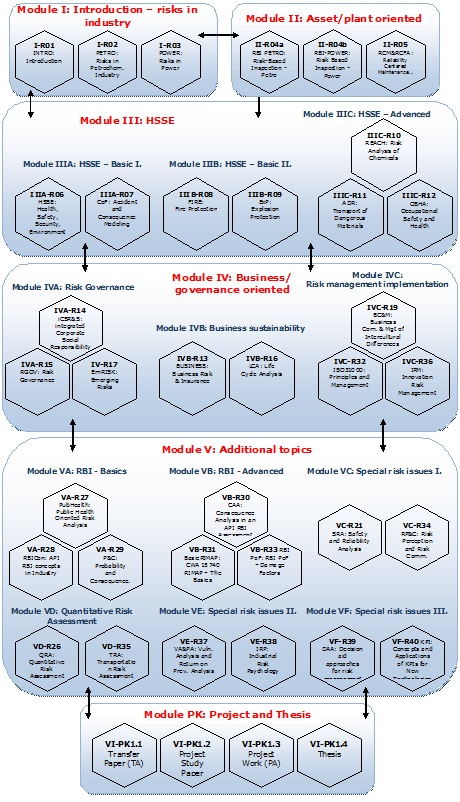The study program is designed and dedicated to the people who have decided to build their professional career in the area of risk. Risk issues in a modern, fast developing industrial world are main topics of the theoretical part of the program. The other section of the program is based on work in real projects within sponsoring companies. The language of study is English.
The students are expected to attend theoretical courses and to pass the related exams, to work during the study and to apply their knowledge directly in real-life situations. This is the innovative dual concept promoted by Steinbeis University Berlin (called the Project Competence Concept). It is a great opportunity for the student to continue the professional work and to obtain an academic degree simultaneously.
The curriculum consists of 5 modules of theoretical education which are combined with project work. Courses from the curriculum last 2-5 days, and they end with a concluding exam. The project work includes practical occupation on relevant problems in the sponsoring company followed by preparation of project study papers and the master thesis.
Lecturers of courses and coaches supervising the students in the project work are selected from among leading experts in corresponding fields. They possess both academic and practical background which provides the genuineness of the study program. This combination allows students to absorb working knowledge fast and to gain skills for practical implementation and relevant problem-solving.
The courses, over 30 of them, are scheduled during the whole year. They are grouped in 5 modules and lead the student from introductory and basic risk issues to specific risk topics. A student can build his own professional profile by careful selection of courses to attend. Short description of each course is available in the curriculum.
Within the Master study curriculum, currently over 30 courses as well as project work and thesis are offered in 6 main Modules (also see Figure 2):
- Intro – general concepts, emphasis on the petrochemical and power industry
- Assets – plants/systems/equipment, emphasis on petrochemical and power industry
- HSSE – Health, Safety, Security, Environment; hazard oriented risk management
- Business/governance – concepts and practical application of business and governance oriented risk management
- Specific (additional) topics – additional facultative courses
- Master thesis and projects aligned with the hands-on training

Figure 2: Honeycomb diagram of the Master study Modules